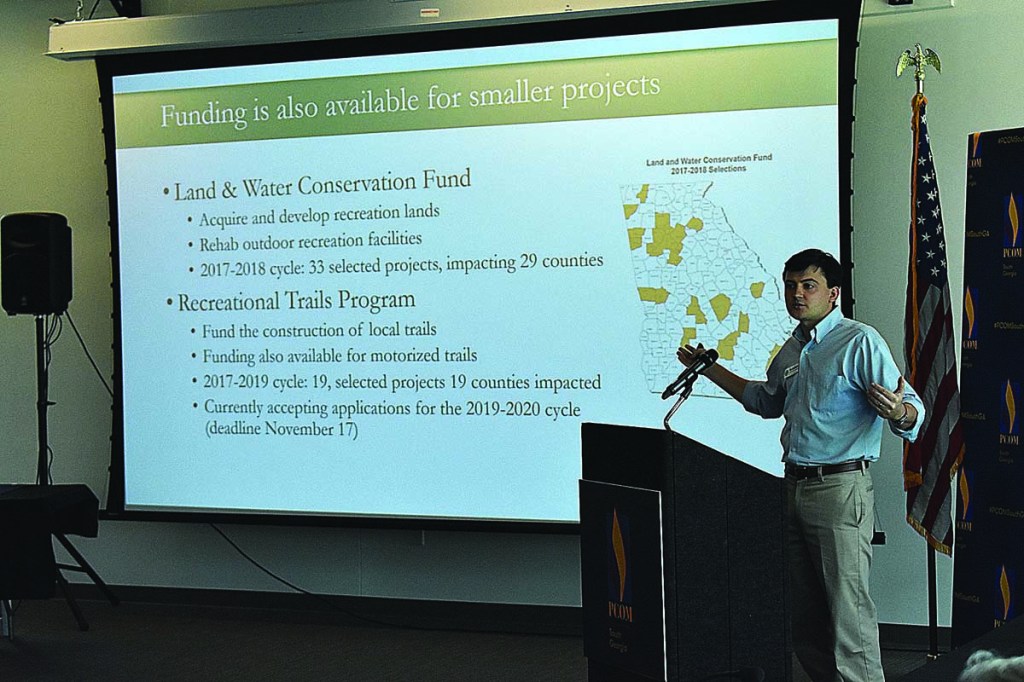Rural Development Council focuses on the workforce during Moultrie meeting
Published 9:19 pm Tuesday, September 10, 2019

- Wes Robinson, director of public and government affairs with the Department of Natural Resources, explains the Georgia Outdoor Stewardship Act and the funds and programs that stem from it.
MOULTRIE, Ga.—In a five-hour meeting Tuesday afternoon, the Georgia House Rural Development Council discussed internet, taxes and business partnerships. Most important of all was its workforce discussion.
The council met at Philadelphia College of Osteopathic Medicine South Georgia in Moultrie for the first day of a two-day meeting. Much was said, much was questioned and answered, but what was on everyone’s mind was growing the rural workforce.
Trending
Jamie Jordan, programs and business services director for the Technical College System of Georgia Office of Workforce Development, took charge to answer.
His panel, Georgia Workforce Development Landscape and Solutions, discussed the ins and outs of Georgia’s current workforce landscape and its potential future.
The current landscape demands people with careers in information technology, healthcare, manufacturing, aerospace, education and agribusiness to name a few.
With that demand, the workforce needs earlier preparation. Enter Worksource Sector Partnerships, an effort to get regions to work collaboratively, Jordan said.
“We’re pulling together K(kindergarten) through 12 (12th grade) with their post-secondary partners and community-based organizations to then also work hand-in-hand with the business community within the region,” he said.
This is so programs within each of 12 regions can meet their specific needs. Jordan said the programs may differ depending on the age group. Career days or exposure programs may be more tailored to elementary students while hands-on experience may fit middle and high schoolers more.
Trending
More than that though, Jordan said the future demand will be automation and machinery; however it doesn’t make manpower extinct. Rather, it calls for a change in thinking.
John “Jad” Dowdy III, chief financial officer of Danimer Scientific and one part of the three-person Georgia Agribusiness and Rural Jobs Act panel, said this is something his company is already looking into.
Danimer Scientific has two plants housed in Bainbridge, Georgia, and with its steady industrial growth, its demand for workforce is heightened.
“The demand [for them] is really high,” Dowdy said. “We’re building our capacity now, investing in equipment which in turn causes us to hire more employees to operate those machines, more scientists to do research work [and] more accounts to pay their payroll.”
But there isn’t always enough workforce in the direct vicinity. Jordan said this calls for rural sourcing instead of outsourcing overseas or out of state. It’s something Dowdy is already familiar with.
Danimer Scientific has employees from Cairo, Colquitt County, and Blakely, Georgia. Since it’s a biotechnology company, it often demands workers with hard-to-find skillsets. Searching outside Bainbridge is a must sometimes.
“Life in southwest Georgia is not for everybody,” Dowdy said. “It’s a lot more likely that a guy that grew up here and has a reason to be here is going to stay versus someone that’s moving here from Boston.”
People who’ve moved from out of state have stayed but Dowdy said the company prefers searching for workforce at home. Even with rural sourcing, issues arise with moving to parts of rural Georgia.
An area’s internet and data coverage is one such issue. Not all parts of rural Georgia have high amounts of data coverage, as stated in the “1-Gigabit Fiber Internet Rollout in Moultrie Georgia” panel.
Barbara Grogan wasn’t on that panel, but she is president of the Moultrie-Colquitt County Development Authority. She said internet is one of the main tools used to recruit businesses.
“I can’t think of any of our (Moultrie’s) employers that do not require it,” she said. “Our schools, medical community, [and] local governments require it. It’s become just as common of a must-have as a road.”
Without internet, businesses may not come. Without business, a workforce may not want to be available and vice versa.
“Workforce is the one thing you cannot overcome,” Grogan said. “If you don’t have [it], right there is where you stop.”
The council also revealed future projects for south Georgia, which include a welcome center in Moultrie, the Georgia Broadband Initiative (an estimated $26 million investment to partner with communities and bring wireless internet and fiber optics to them), Georgia Initiative for Community Housing (a three-year planning program partnering businesses and communities to identify local needs and resources), a northwest Georgia worksource partnership and a southwest Georgia healthcare partnership.
Day two of the House Rural Development Council meeting will be on Wednesday, Sept. 11, from 8 a.m. to noon.





